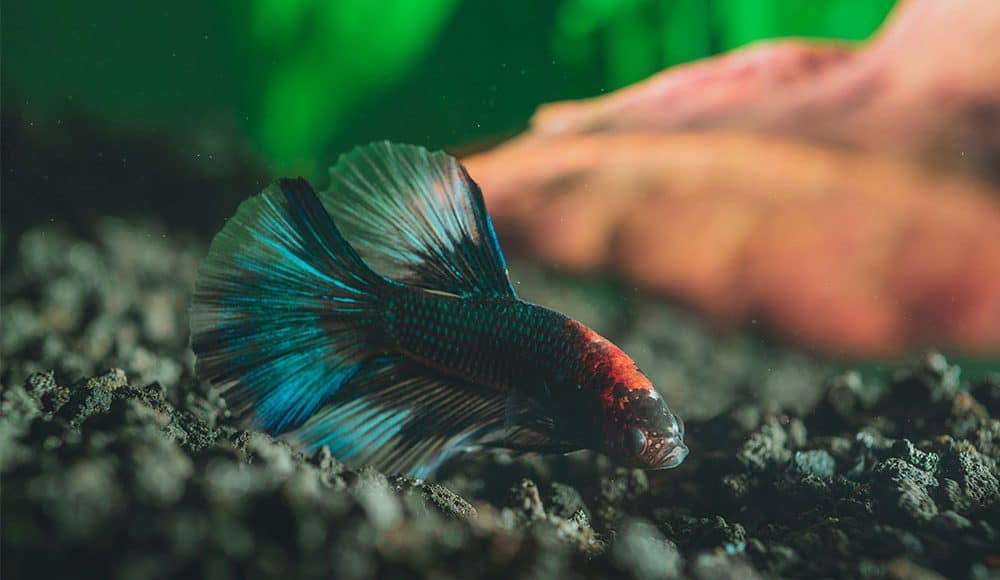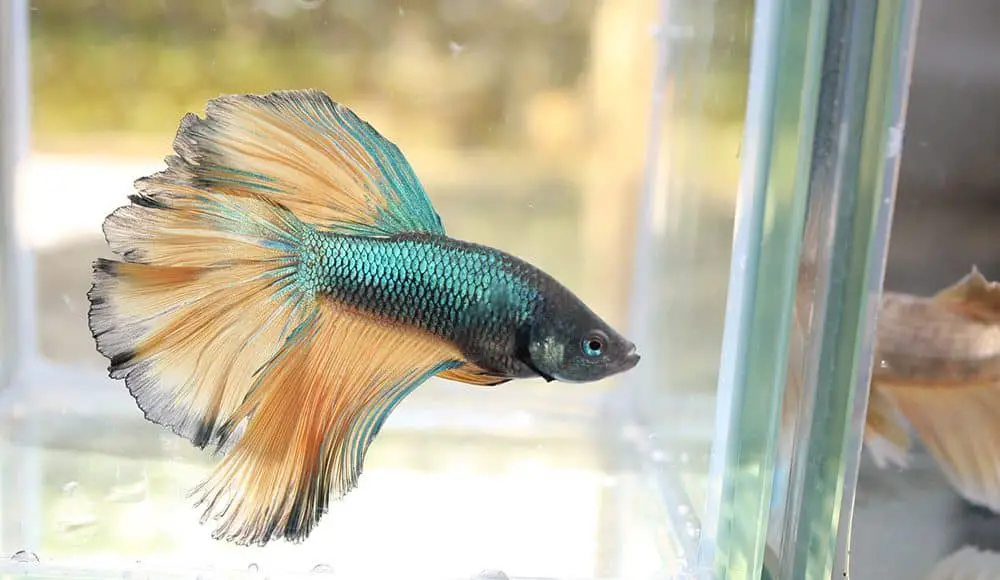Last Updated on October 15, 2020
Betta fish owners will know if their bettas are acting strange. One of the unusual behaviors is when the betta lays at the bottom of the tank frequently. They would even stay at the bottom for long. As a pet owner, it’s natural to worry and check if it’s something serious.
Is it moving or staying still?
Are there any appetite changes or discoloration on their fins?
Is it just a normal characteristic of your betta or could it be a serious illness that needs immediate care?
These questions may arise as you look carefully and check how your betta fish is doing.
There are various reasons your betta fish will stay at the bottom of the tank. To find out what your betta may experience, keep reading below.
Table of Contents
Why does my betta fish stay at the bottom of the tank?
Seeing your betta fish at the bottom of the tank can be concerning especially if it’s an unusual behavior from their regular daily activities.
Here are the most common ones why your betta fish lays at the bottom of the tank:
Temperature Shock
When you move bettas from a warm or cool tank to another, it’s possible that they might go into shock. Any sudden changes in your tank’s temperature can lead to your betta to stay still or lay at the bottom of the tank. The optimal temperature of the tank should be between 74° and 79°F.
You can also turn off the lights on your fish tank to let your betta rest.
Ammonia Poisoning
Ammonia is produced by the betta’s biological waste. Bettas can put up with ammonia poisoning more than other fish, but it’s still poisonous to them. Ammonia poisoning in betta fish is difficult to distinguish and it can kill them if you don’t catch it on time.
Ammonia poisoning can happen when you set up a new tank or add too many fish in a tank. Check if the gills of your betta is burning or if it’s swimming in darting movements. If this is the case, you need to clean your fish tank and replace it with dechlorinated water.
Swim Bladder Disease
If your betta fish is at the bottom and is floating upside down, swim bladder disease is likely to be the case. In a rare case, it can become fatal but swim bladder disease can easily be curable by letting your betta fast for a few days or at least 3 days. It may seem like a long fast for you, but betta fish can go on for more days without food.
Aside from a change in diet, check whether it’s caused by bacterial infection by looking at the colors of their scales.
Constipation
How much do you feed your betta and what kind of food do you give them? Betta fish have a short digestive tract so constipation can easily happen.
If your betta is laying at the bottom of the tank and looks to have a bloated stomach, it’s possible that they are constipated. Overfeeding or having insufficient fiber in their diet can lead to constipation. Adjust their diet and let them fast for 2-3 days and see if they will poop during the fast.
Pregnant
If the belly of your female betta fish is bulging and has a round white patch, it could be because they are pregnant. You may also see your male betta fish may also start building bubble nests to fertilize the eggs.
Move your female betta to a breeding tank so she can have her privacy and is not bothered by other swimming fish.
Old Age
The average lifespan of a betta is 3 years but some can live up to 4 to 5 years if they have the perfect habitat and are well-taken care of. If you know the age of your betta when you bought it from a breeder, then it’s easy to tell whether they are on their senior stage.
Older betta fish may love to hug the bottom of the tank or even the sides. The color of old betta fish will fade and white dots may also show in time. Loss of vision, decrease in appetite, and frequent naps are also signs that your betta is near the end of their life span.
Sleeping or Resting
Some betta fish may prefer sleeping at the bottom of the tank because of the filter current above the tank. Bettas will take quick naps during the day. Just check if they are back to normal in a few minutes so you don’t disturb its peaceful snooze.
Related: Can Betta Fish See in the Dark?
Boredom
If there is nothing to do in the tank, they might as well be still at the bottom of the tank. Add decorations, gravel, some plants, or have a change of scenery to keep them entertained. You can also buy dedicated toys for betta fish like ping-pong balls.
It’s Dead
Sadly, betta fish can die suddenly if signs of illness aren’t visible or were addressed late. You will see your betta laying at the bottom of the aquarium if it’s dead. When this happens, clean your aquarium well and remove any rotten remains to avoid causing problems to any of its tank mates.
These are the common answers to your question of, “Why does my betta fish stay at the bottom of the tank?”
Now, we will talk about how to properly care for your betta fish and how to check the signs to make sure that your betta is at its top health.
Signs of betta fish illness

We know Betta fish for its beautiful color and tail, unusual changes in its body may be serious and can lead to death.
Check your betta for these signs of illness:
- Fin or tail rot
- Swelling belly
- Discolored body
- Lethargic
- Troubled breathing
- Bulging eyes
- Raised scales
- Inflamed gills
- White spots
Once you notice any of these signs above, prepare to do a serious job as a pet owner.
Related: 10 Betta Fish Diseases and Symptoms (and How to Treat Them)
Here are the key things you need to remember to ensure your betta’s health and happiness:
- Prepare your medicines like ampicillin or tetracycline that you can add to your aquarium. Add the medication depending on the size of your tank.
- Place the rocks in the oven for one hour and let them cool before you place them again in your tank.
- Change the water every 3 days at the minimum to ensure that your betta lives in a clean environment.
- Thoroughly clean the gravel and artificial plants. Scrub them well to avoid any disease that may lead to fungi.
- Use a water conditioner to treat the whole tank. Use one drop per 1 gallon but check if the label recommends otherwise.
- Have an extra tank. If your betta fish is sick, you need to isolate it as soon as you can.
- Use a thermometer to ensure that the tank’s temperature is just right.
How to Save a Dying Betta Fish
If your betta fish is laying at the bottom of the tank and is lethargic, immediate care should take place.
There are first aid kits available that contain basic medicines like ampicillin, bettamax, kanamycin, tetracycline, and fungi remover. Use them accordingly.
You also need to disinfect the tank and add aquarium salt to the water. If you can, provide them with a better tank and a better environment to help them thrive.
Last, isolate your sick fish at once and do not add additional fish to your dying betta until it gets healthier.
Related: How Do You Know If Your Betta Fish Is Dying
What Does a Healthy Betta Fish Look Like?

As a betta fish owner, you definitely want to keep your betta happy and healthy. But unlike dogs, their emotions are not as easily distinguishable. But there are ways to tell if they are having a blast in your tank, here are some of them:
Your betta loves to eat as much food – If they actively swim and gobble on their food as soon as you put its meal into the tank, then it means that they have a big appetite and are feeling good.
Your betta is energetic – If it’s swimming around and swims, even more, when you’re present it means that it likes you, showing off, and is living its best life.
Your betta’s color is clear and bright – A healthy betta fish has vibrant colors and smooth scales.
Your betta loves to engage with you – Betta fish know you as their guardians and may even be excited and swim around when you come near its tank.
These are the telltale signs that you will notice and be able to confirm if your betta is happy. Once you recognize these signs, keep at it as it definitely looks like you’re doing a superb job as a betta owner.
How to make sure that your betta is happy and healthy
Ensuring the happiness of your betta fish is necessary not only for the betta but for you, as a pet owner. Knowing that your betta feels safe with you is a good sign of great companionship.
To keep them healthy is to keep them happy.
We’ve listed the things you can do to ensure that they have the best life you can give.
Create a great habitat
Keeping your betta fish happy means it has all it needs in its home. Coming from Southeast Asia, betta fish live in warm water with lots of plants and low water flow.
A 5-gallon size of the tank is the most recommended to keep them active and encourage them to swim around and play. Having plenty of space with plants and semi-soft substrates will also keep them happy.
Another way is to add little caves or suction cups for them to hide and play and use as a resting place.
Keep the water clean
It’s crucial that your betta’s water is clean and safe. As mentioned, they do like warmer water with around 74°F to 79°F.
Check if pH level is around 7.0 and ensure that the water doesn’t have any nitrite or ammonia present.
Any chemical buildups may hurt your betta, clean your fish tank regularly and always check the temperature to make sure that your betta is living in a safe place.
Feed them properly
The good old pellets and flakes may be fine, but having some treats will make them happy. Betta fish love lives bloodworms, brine shrimps, and daphnia.
Bettas need food rich in protein and while flakes are fine to use, they don’t have enough nutrients found in meat.
Do not overfeed your betta fish as they are at risk for constipation or swim bladder disease. If you notice your betta fish has a bloated belly, try to feed it with a de-shelled and diced pea.
Give them toys
A good way to keep your betta happy and entertain is to give them toys to play with. Betta fish likes to push things around so ping-pong balls or betta balls are quite popular.
Laser pointers are also good for both of you to have a little bonding time. Like cats, they are curious and will follow the pointer which can also help them exercise.
Check if they do or don’t want a tank mate
Bettas are territorial and can be aggressive, especially the wild ones. While you may think that your single betta is lonely, your betta fish can thrive by itself. Try not to apply human emotions as some bettas have different concerns.
But, do not push out the idea of getting it a tank mate as it’s possible that they do want one. Male bettas are aggressive to other male bettas so you can opt for another type of fish instead.
Consider going for guppies, African dwarf frogs, and cory catfish. Monitor any interactions and provide caves and plants as hiding places. Remove the tank mates the moment you see conflicts as it may be stressful for both of them.
Watch for any signs of illness
Make sure you learn and know how to figure out when your fish is experiencing discomfort that we’ve also covered above so you can fix it as soon as you can.
Related: How Do You Know A Betta Fish Is Happy?
Conclusion
We covered the answer to the common question of: “Why does my betta fish stay at the bottom of the tank?”
Knowing the signs is critical so you can distinguish whether it’s a normal betta fish trait or a serious medical problem that can hurt not only your betta but also its tank mates.
